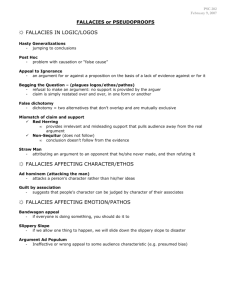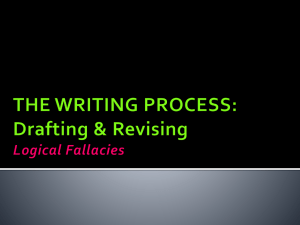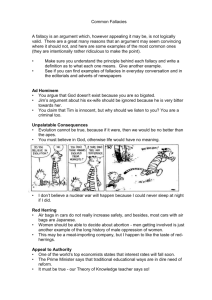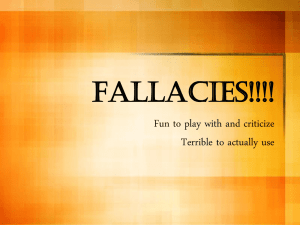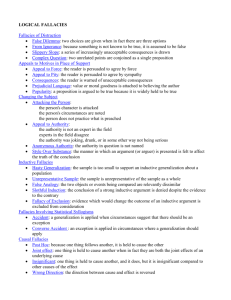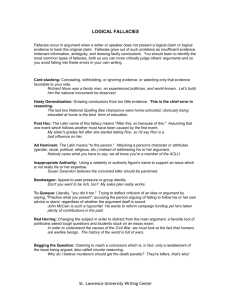Rhetorical Fallacies Notes
advertisement
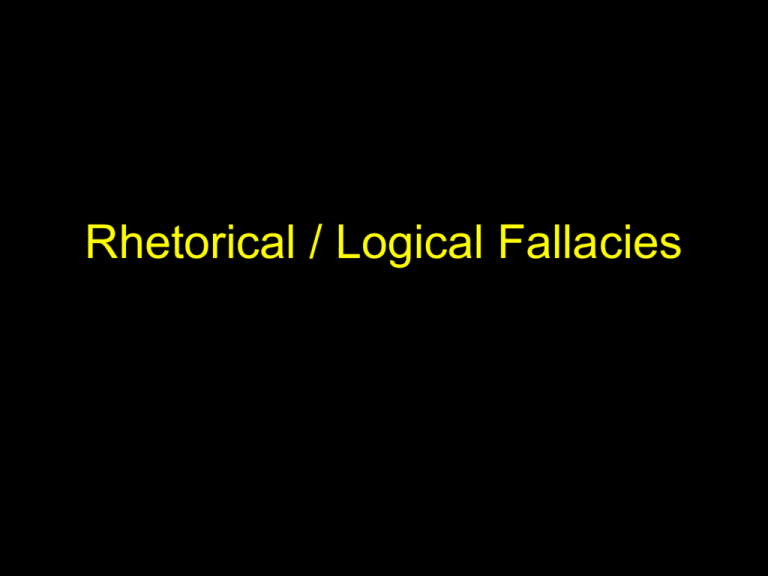
Rhetorical / Logical Fallacies What is an Argument? • An argument must be based on sound reasoning • There are two important components to an argument: premises and conclusion – Premise: an assertion that will support a conclusion (i.e. evidence) • The most important part of any premise is that your audience will accept it as true. • If your audience rejects even one of your premises, they will likely also reject your conclusion, and your entire argument will fall apart – Conclusion: the logical concept, based upon premises, that is being asserted • Audience may not have to accept a conclusion as true • Evidence will try to persuade the audience of a conclusion’s truth • A thesis statement is a conclusion. Validity and Soundness • Validity – an argument is considered valid if its construction ensures that, if the premises were to be true, the conclusion necessarily must be true. – The premises do not actually have to be true for an argument to be valid. The argument’s construction simply means that if the premises are true, the conclusion cannot be false. – Example: Valid and true premises Either Elizabeth owns a Honda or she owns a Saturn. Elizabeth does not own a Honda. Therefore, Elizabeth owns a Saturn. – Example: Valid but untrue premises All toasters are items made of gold. All items made of gold are time-travel devices. Therefore, all toasters are time-travel devices. • Soundness – an argument is considered sound if it is both valid and uses premises that are actually true. – Example: No felons are eligible voters. Some professional athletes are felons. Therefore, some professional athletes are not eligible voters. What is a Fallacy? • Fallacies are flaws in reasoning that detract from the validity and/or soundness of an argument • Sometimes their use is by accident; others, they are used to deliberately mislead or “win” an argument Example: "Eating five candy bars and drinking two sodas before a test helps me get better grades. I did that and got an A on my last test in history.” What’s wrong with this line of reasoning? Answer: The argument is fallacious because it falsely assumes that since the one thing (eating five candy bars) immediately precedes the other (getting an A), the relationship is causal. Why Can Fallacies Be Difficult to Identify? • Some fallacious arguments actually are valid, but not sound. • Many arguments can be difficult to parse, i.e. break down into core premises • Many people actually are persuaded by fallacious arguments, and might believe them to be sound and/or true when they really aren’t. Categories of Rhetorical Fallacies Since there are three primary argumentative modes, there are three categories of fallacies: • Logical (Logos) – Flaws in logical reasoning • Ethical / Authoritative (Ethos) – Appealing to authority or morality on its own terms • Emotional (Pathos) – Trying to manipulate emotionally or to scare people Fallacies of Logic • • • • • • • • Hasty Generalization Post Hoc Non sequitur Equivocation Begging the Question Faulty Analogy Stacked Evidence Appeal to Ignorance Hasty Generalization • Conclusion is drawn based on little or insufficient evidence • Example: “That restaurant’s food is terrible! I ate there once and my food was undercooked.” • Why is this fallacious? Post Hoc, Ergo Propter Hoc • Latin for “after this, therefore because of this” • Assumes that because an event happens before another event, that the first event actually causes the second • Also known as false cause fallacy • Example: “A year after the release of the violent shoot-’em-up video game Annihilator, incidents of school violence tripled… surely not a coincidence.” • Why is this fallacious? Non sequitur • Latin for “it doesn’t follow” • Argument does not follow any sort of logical sequence • Example: “It rained so hard that Jenn actually called me!” • Example: “My dog got so sick that my grandma made stew.” • What’s wrong with these arguments? Equivocation • Commonly referred to as “half-truths” • A partially correct statement that tries to hide behind double meanings • Example: “I did not have sexual relations with that woman.” – Former President Bill Clinton Begging the Question • Circular argument • The premise and the conclusion are the same thing stated differently • Example: “His lies are evident from the untruthful nature of his statements.” Faulty Analogy • An inaccurate, inappropriate comparison between two things • Example: “Forcing students to attend cultural events is like leading cattle to slaughter.” Stacked Evidence • Distorts an issue by overwhelmingly supporting or representing only one part of it • Usually done intentionally to make one particular part of an issue appear clearly favorable to the others • Example: “Cats are superior to dogs because they are cleaner, cuter, and smarter.” Appeal to Ignorance • Asserts that since an argument cannot be disproven, it therefore is true • Burden of proof always rests with the affirmative • Example: “Aliens exist because you cannot prove that they don’t.” Ethical / Authoritative Fallacies • • • • • • False Authority Authority as Evidence Guilt by Association Dogmatism Ad Hominem Strawman False Authority • Claims that an assertion is true based solely on the person who made the assertion • Example: “Mr. King says that the sky is red, and Mr. King is smart, so it must be true.” Authority as Evidence • A speaker uses his or her own authority to prove that a claim is true • Usually such claims are totally unrelated to the speaker’s own expertise • Example: “Dr. Pepper is smooth. Trust me – I’m a doctor.” • Example: “My friend would never rob a bank. Trust me.” Guilt by Association • Assumes that an argument is true because the person involved is associated with someone or something negative • Example: “Tom’s friend robbed a bank, so Tom is a bad person.” Dogmatism • A claim is assumed true because the speaker believes it to be true • Otherwise known as “because I said so” • Example: “Penguins are reptiles, and that’s that.” Ad Hominem • Instead of debating an issue, the speaker attacks the person who makes a competing claim • Often seen in political campaigns • Example: “How can we trust Ms. Ware to run the city when she can’t even handle her own marriage?” • Example: “Senator Kelly’s plan is terrible because Kelly is a communist.” Strawman • A speaker misrepresents or oversimplifies an opposing view in order to tear it down • Example: – Will: “We should put more money into health and education.” – Warren: “I am surprised that Will hates our country so much that he wants to leave it defenseless by cutting military spending.” Emotional Fallacies • • • • • • Red Herring Scare Tactics Bandwagon (Ad Populum) Slippery Slope Either / Or Appeal to Pity Red Herring • An irrelevant distraction, attempting to mislead an audience by bringing up an unrelated, but usually emotionally loaded issue. • "In regard to my recent indictment for corruption, let’s talk about what’s really important instead-terrorists are out there, and if we don't stop them we're all gonna die!" Scare Tactics • Tries to manipulate people’s fears to sway their decisions • Example: “If you don’t vote for Deutscher for President, the economy will implode and your family will starve.” Bandwagon • Also known as “Ad Populum” • Implies that a choice is correct because it is popular • Often used in advertising – celebrity spokesperson • Example: “Five million Coke drinkers can’t be wrong!” Slippery Slope • Argues that one thing automatically will lead to another – usually with disastrous results • The cause and effect relationship often is completely exaggerated or absurd • Example: “If we allow gay marriage, then people will start practicing polygamy and marrying their pets, and the fabric of society will crumble.” Either / Or Choices • Setting up a false dichotomy for an issue • Inaccurately reduces an issue to two possible outcomes • Usually one outcome is absurd and the other is infinitely favorable • Example: “You can either approve the new tax plan or you can say goodbye to adequate emergency services!” Appeal to Pity • Using feelings of sympathy or sorrow to convince someone • Making the audience feel sorry for someone is not by itself a sufficient argument • Example: “I’ve been having such a hard time recently, Mr. King. My printer broke, my cat died – twice – and I got grounded. Please just give me an A on the paper.” For More Information… • http://writingcenter.unc.edu/handouts/fallacies • This is an excellent resource providing explanations and examples of the various types of rhetorical fallacies • We also will look at numerous examples and applications of rhetorical fallacies in class.
